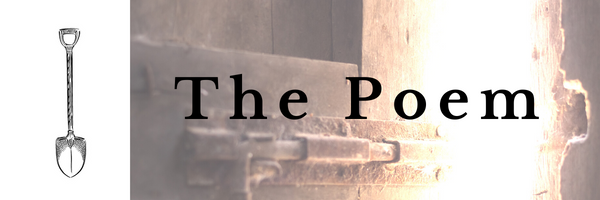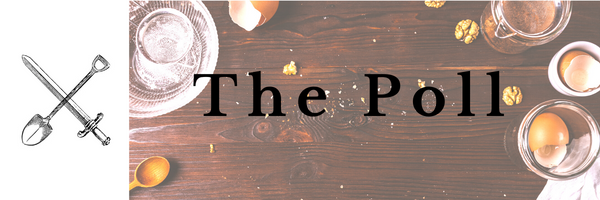
Don't Read Alone
Jason M. Craig
You might be completely misunderstanding and misusing your Sword&Spade subscription… Let me explain via example.
Charles Rumore, S&S co-editor, and I were driving together recently, discussing and debating Jayber Crow, my favorite Wendell Berry novel which he finally got around to reading. Charles thought Jayber’s celibacy was strange to his place. I thought it was priestly. In the backseat listening was an S&S subscriber. After a pause in the conversation he asked, “Why do you guys publish a magazine?”
I was ready to pounce on the offer, providing all the reasons and philosophies behind it, like the fact that reading on a page is more impactful on the intellect and memory than scrolling on a screen; how men are often eager to engage their minds more deeply but don’t know where to start; or maybe the fact that the intertwining of classical, ecclesial, and contemporary thought helps us see the common thread of truth running through history and our own lives – as if there is a Word through which all things were made. I know for a fact there is nothing like S&S out there and I was eager to expound. But my co-pilot and co-editor got to it first…
“Phil,” Charles said, “when was the last time you heard two men discussing a book they read?”
He said he couldn’t remember.
“Do you think its good and important that men learn how to converse about the truth?”
“I know it’s important,” he responded. “I just never see it happen.”
“That’s why we publish Sword&Spade magazine,” said Charles.
Think about it. Your mind is always going. The intellect is hungry and, as St. Thomas Aquinas says so well, it is hungry for truth. The way we arrive at truth is the way all humans do, by experience – even experimentation – and that slow process of learning that comes from listening, mulling, talking, debating, and thinking. This is how we were made. Our intellect matures by action and engagement and, if we look back at the thousands of years of progress in wisdom and understanding, men need that breathing in and out of personal reflection and corporal discussion. The “achievement” of the West is our inheritance, and it is for good reason it is called The Great Conversation. Not just a conversation – the conversation. There’s plenty of examples:
- The Apostles listened and discussed, debated, and fought about the Word as it was delivered.
- The first Christians dedicated themselves to the teachings of the Apostles – this is corporal learning assisted by books.
- Socrates is famous with the other inherited greats of antiquity – Plato, Cicero, etc. – for arriving at a clearer truth through conversation. Of course, Sacrates was famous for being skeptical of books so, like Jesus, he didn’t write anything down. (Luckily his student Plato did.)
- St. Augustine’s massive contribution was in this context, and really began at Cassiciacum, where he first gathered friends to discuss revelation and philosophy to try to come to a closer understanding of truth and, ultimately, God.
- The rise of Christendom happened alongside the literal institutionalized conversation of the “University,” a Catholic achievement, which St. John Henry Newman said was simply friends in conversation about the truth.
- In our modern times, the seemingly undying witness and fruitfulness of the Integrated Humanities Program made famous by the writing and impact of John Senior, was literally designed around 3 friends discussing “the great books.”
Simply put, there is a constant practice in our inheritance where one gains wisdom by reading and discussing with friends. In fact, those friends that you can do such things with are the truest of friends, because your relationship makes you more virtuous and wiser.
I wrote something about this here, but to define how we are “learning” today is not virtuous, but actually vicious (which means full of vice).
- “Facts” have replaced truth, which is a reduction of wisdom to expertise or “knowing stuff” for some base use like power or money.
- Wisdom has been displaced by expertise, which may have noble origins but is not defined by being able to harness “knowing stuff” for the sake of profitability. The ancients called them sophists. We call them experts and influencers (two groups more closely aligned these days).
- Sages have been replaced by fact-checkers, the dubiously self-proclaimed guardians of the facts.
- Our minds are literally scrambled – our brains are physically altered – by the constant scrolling and scanning.
- Our reading is completely swarmed by advertisements because the content we’re reading is generated to sell our gaze, not deepen it.
- We are not active in our intellectual engagement, but passive. We allow the “feeds” to shovel in whatever the algorithm decides, which is likely not just potentially dangerous but positively sinful. Aquinas defines the vice of curiositas as the undisciplined scanning for interesting and titillating “content” and not the focused study of truth, which is the virtue of studiousness.
- If a machine decides what you’re going to read instead of you or a mentor, how can that be studious?
- In fact, the algorithms probably know our habits of thought more than we do, because we let them “read” us all day and consider our motives and desires more than we do. Ah, to be known by the machine!
- Because local cultures (which is the only true culture) are gone, we are all succumbed to the latest mass-culture episode, controversy, or “thing”. And, lest we think we’ve escaped it, I bet we’ve all discussed Bruce Jenner more often in public than a worthy author, prophet, or true sage.
- Friends share – via group texts – memes and little “bites” of things, feeding the whole cycle instead of escaping it. This might be because we have an easier time relating to each other the way we relate on the internet. That’s disgusting and inhumane.
This all results in minds that are shallow and distracted. And we wonder why we can’t pray well… Oh, and we wonder why our friendships and conversations seem so shallow…
Because they are.
This is a rather long way to say this: never read Sword&Spade alone. Well, read alone – but then gather your friends to discuss these things. Our issues are substantive and challenging. We’re not just re-hashing the same pop-Catholic “content” that is gussied up on the Internet as something worth your time. These are articles and ideas from real men in the trenches of leading and living the faith in actual communities. Until men actually gather to imbibe these ideas into their actual culture through conversation, the magazine’s impact is stunted.
Or, we’ll do our job of getting the magazine to you. You do your job of arguing about it.
Children of Light
Our fathers wrung their bread from stocks and stones
And fenced their gardens with the Redmen's bones;
Embarking from the Nether Land of Holland,
Pilgrims unhouseled by Geneva's night,
They planted here the Serpent's seeds of light;
And here the pivoting searchlights probe to shock
The riotous glass houses built on rock,
And candles gutter by an empty altar,
And light is where the landless blood of Cain
Is burning, burning the unburied grain.
~Rober Lowell
Read More

Do you discuss Sword&Spade with others?
Vote Now!

